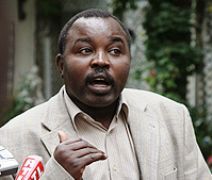SLM’s rejection of Doha was not liked to ICC – leader
March 29, 2009 (PARIS) — The leader of the rebel Sudan Liberation Movement (SLM), Abdel Wahid Al-Nur stressed today his rejection to take part in any peace process unless the security of Darfur civilians is ensured.

The Libyan Ambassador Abdurrahman Mohamed Shalgham who chairs the Council for this month told reporters that two issues complicate the ongoing peace efforts: the Sudan-Chad relations and the ICC decision which prompted the rebel groups to raise the level of their demands; some rebels object to the recent aid expulsions but others reject the talks categorically, saying Bashir is not legitimate.
The Justice and Equality Movement (JEM) signed with the Sudanese government on February 17 a goodwill agreement but it suspended its participation in the process following the expulsion of the foreign NGOs that Khartoum ordered out on March 4 accusing them of cooperation with the International Criminal Court.
“We never committed our self to this process and since the beginning we explained to Mr. Bassolé our position on the peace talks” said Al-Nur who added that his movement would not participate at any negotiations in the future if the government backed militias are not disarmed, the IDPs returned to their homeland and the newcomers are removed.
“Of course, now, the return of the evicted aid groups should be taken in consideration,” Al –Nur added.
On March 4, the International Criminal Court (ICC) issued a warrant for President Omar al-Bashir of Sudan on seven counts of war crimes and crimes against humanity for his role in massive atrocities in Darfur.
The rebel leader further said SLM’s position on the peace process was not linked to the ICC decision against the Sudanese President. “Despite our announced support the ICC and the trial of (President) Al-Bashir and anyone who committed crimes in Darfur, we do believe that the ICC is a judiciary institution and not a political body,” he added.
Al-Nur underscored that the indictment of the Sudanese president has created a new reality in the country and his movement formulated, as it is the case for other political forces inside the country, a paper proposing an alternative solution for the future of the whole Sudan.
“As political movement we have to study the situation and propose alternative solutions for the future of the country, and in order to achieve security and peace for all the citizens.”
He added that in all these situations the solution of Darfur conflict should pass through the security on the ground in order to protect the civilians.
The United Nations says 300,000 people have died in the six-year-long conflict between Darfur’s ethnic minority rebels and the Arab-dominated government in Khartoum, which puts the figure at only 10,000. An estimated 2.7 million more have fled their homes.
(ST)
